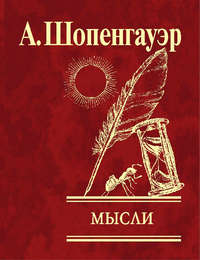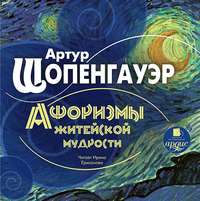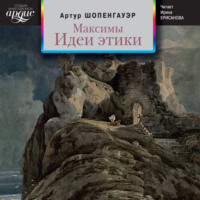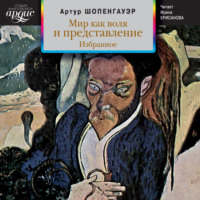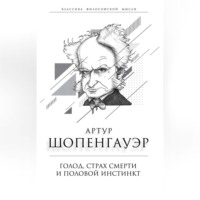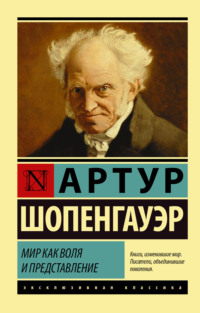 полная версия
полная версияThe World as Will and Idea (Vol. 3 of 3)
I have here also to remark that the maintenance of the life process, although it has a metaphysical basis, does not go on without resistance, and consequently not without effort. It is this to which the organism yields every night, on account of which it then suspends the brain function and diminishes certain secretions, the respiration, the pulse, and the development of heat. From this we may conclude that the entire ceasing of the life process must be a wonderful relief to its motive force; perhaps this has some share in the expression of sweet contentment on the faces of most dead persons. In general the moment of death may be like the moment of awaking from a heavy dream that has oppressed us like a nightmare.
Up to this point the result we have arrived at is that death, however much it may be feared, can yet really be no evil. But often it even appears as a good thing, as something wished for, as a friend. All that have met with insuperable obstacles to their existence or their efforts, that suffer from incurable diseases or inconsolable griefs, have as a last refuge, which generally opens to them of its own accord, the return into the womb of nature, from which they arose for a short time, enticed by the hope of more favourable conditions of existence than have fallen to their lot, and the same path out of which constantly remains open. That return is the cessio bonorum of life. Yet even here it is only entered upon after a physical and moral conflict: so hard does one struggle against returning to the place from which one came out so lightly and readily, to an existence which has so much suffering and so little pleasure to offer. The Hindus give the god of death, Yama, two faces; one very fearful and terrible, and one very cheerful and benevolent. This partly explains itself from the reflections we have just made.
At the empirical point of view at which we still stand, the following consideration is one which presents itself of its own accord, and therefore deserves to be accurately defined by illustration, and thereby referred to its proper limits. The sight of a dead body shows me that sensibility, irritability, circulation of the blood, reproduction, &c., have here ceased. I conclude from this with certainty that what actuated these hitherto, which was yet always something unknown to me, now actuates them no longer, thus has departed from them. But if I should now wish to add that this must have been just what I have known only as consciousness, consequently as intelligence (soul), this would be not only an unjustified but clearly a false conclusion. For consciousness has always showed itself to me not as the cause, but as the product and result of the organised life, for it rose and sank in consequence of this in the different periods of life, in health and sickness, in sleep, in a swoon, in awaking, &c., thus always appeared as effect, never as cause of the organised life, always showed itself as something which arises and passes away, and again arises, so long as the conditions of this still exist, but not apart from them. Nay, I may also have seen that the complete derangement of consciousness, madness, far from dragging down with it and depressing the other forces, or indeed endangering life, heightens these very much, especially irritability or muscular force, and rather lengthens than shortens life, if other causes do not come in. Then, also: I knew individuality as a quality of everything organised, and therefore, if this is a self-conscious organism, also of consciousness. But there exists no occasion now to conclude that individuality was inherent in that vanished principle, which imparts life, and is completely unknown to me; all the less so as I see that everywhere in nature each particular phenomenon is the work of a general force which is active in thousands of similar phenomena. But, on the other hand, there is just as little occasion to conclude that because the organised life has ceased here that force which hitherto actuated it has also become nothing; as little as to infer the death of the spinner from the stopping of the spinning-wheel. If a pendulum, by finding its centre of gravity, at last comes to rest, and thus its individual apparent life has ceased, no one will imagine that gravitation is now annihilated; but every one comprehends that, after as before, it is active in innumerable phenomena. Certainly it might be urged against this comparison, that here also, in this pendulum, gravitation has not ceased to be active, but only to manifest its activity palpably; whoever insists on this may think, instead, of an electrical body, in which, after its discharge, electricity has actually ceased to be active. I only wished to show in this that we ourselves recognise in the lowest forces of nature an eternity and ubiquity with regard to which the transitory nature of their fleeting phenomena never makes us err for a moment. So much the less, then, should it come into our mind to regard the ceasing of life as the annihilation of the living principle, and consequently death as the entire destruction of the man. Because the strong arm which, three thousand years ago, bent the bow of Ulysses is no more, no reflective and well-regulated understanding will regard the force which acted so energetically in it as entirely annihilated, and therefore, upon further reflection, will also not assume that the force which bends the bow to-day first began with this arm. The thought lies far nearer us, that the force which earlier actuated the life which now has vanished is the same which is active in the life which now flourishes: nay, this is almost inevitable. Certainly, however, we know that, as was explained in the second book, only that is perishable which is involved in the causal series; but only the states and forms are so involved. On the other hand, untouched by the change of these which is introduced by causes, there remain on the one side matter, and on the other side natural forces: for both are the presupposition of all these changes. But the principle of our life we must, primarily at least, conceive as a force of nature, until perhaps a more profound investigation has brought us to know what it is in itself. Thus, taken simply as a force of nature, the vital force remains entirely undisturbed by the change of forms and states, which the bond of cause and effect introduces and carries off again, and which alone are subject to the process of coming into being and passing away, as it lies before us in experience. Thus so far the imperishable nature of our true being can be proved with certainty. But it is true this will not satisfy the claims which are wont to be made upon proofs of our continued existence after death, nor insure the consolation which is expected from such proofs. However, it is always something; and whoever fears death as an absolute annihilation cannot afford to despise the perfect certainty that the inmost principle of his life remains untouched by it. Nay, the paradox might be set up, that that second thing also which, just like the forces of nature, remains untouched by the continual change under the guidance of causality, thus matter, by its absolute permanence, insures us indestructibility, by virtue of which whoever was incapable of comprehending any other might yet confidently trust in a certain imperishableness. “What!” it will be said, “the permanence of the mere dust, of the crude matter, is to be regarded as a continuance of our being?” Oh! do you know this dust, then? Do you know what it is and what it can do? Learn to know it before you despise it. This matter which now lies there as dust and ashes will soon, dissolved in water, form itself as a crystal, will shine as metal, will then emit electric sparks, will by means of its galvanic intensity manifest a force which, decomposing the closest combinations, reduces earths to metals; nay, it will, of its own accord, form itself into plants and animals, and from its mysterious womb develop that life for the loss of which you, in your narrowness, are so painfully anxious. Is it, then, absolutely nothing to continue to exist as such matter? Nay, I seriously assert that even this permanence of matter affords evidence of the indestructibility of our true nature, though only as in an image or simile, or, rather, only as in outline. To see this we only need to call to mind the explanation of matter given in chapter 24, from which it resulted that mere formless matter – this basis of the world of experience which is never perceived for itself alone, but assumed as constantly remaining – is the immediate reflection, the visibility in general, of the thing in itself, thus of the will. Therefore, whatever absolutely pertains to the will as such holds good also of matter, and it reflects the true eternal nature of the will under the image of temporal imperishableness. Because, as has been said, nature does not lie, no view which has sprung from a purely objective comprehension of it, and been logically thought out, can be absolutely false, but at the most only very one-sided and imperfect. Such, however, is, indisputably, consistent materialism; for instance, that of Epicurus, just as well as the absolute idealism opposed to it, like that of Berkeley, and in general every philosophical point of view which has proceeded from a correct apperçu, and been honestly carried out. Only they are all exceedingly one-sided comprehensions, and therefore, in spite of their opposition, they are all true, each from a definite point of view; but as soon as one has risen above this point of view, then they only appear as relatively and conditionally true. The highest standpoint alone, from which one surveys them all and knows them in their relative truth, but also beyond this, in their falseness, can be that of absolute truth so far as this is in general attainable. Accordingly we see, as was shown above, that in the very crude, and therefore very old, point of view of materialism proper the indestructibility of our true nature in itself is represented, as by a mere shadow of it, the imperishableness of matter; as in the already higher naturalism of an absolute physics it is represented by the ubiquity and eternity of the natural forces, among which the vital force is at least to be counted. Thus even these crude points of view contain the assertion that the living being suffers no absolute annihilation through death, but continues to exist in and with the whole of nature.
The considerations which have brought us to this point, and to which the further explanations link themselves on, started from the remarkable fear of death which fills all living beings. But now we will change the standpoint and consider how, in contrast to the individual beings, the whole of nature bears itself with reference to death. In doing this, however, we still always remain upon the ground of experience.
Certainly we know no higher game of chance than that for death and life. Every decision about this we watch with the utmost excitement, interest, and fear; for in our eyes all in all is at stake. On the other hand, nature, which never lies, but is always straightforward and open, speaks quite differently upon this theme, speaks like Krishna in the Bhagavadgita. What it says is: The death or the life of the individual is of no significance. It expresses this by the fact that it exposes the life of every brute, and even of man, to the most insignificant accidents without coming to the rescue. Consider the insect on your path; a slight, unconscious turning of your step is decisive as to its life or death. Look at the wood-snail, without any means of flight, of defence, of deception, of concealment, a ready prey for all. Look at the fish carelessly playing in the still open net; the frog restrained by its laziness from the flight which might save it; the bird that does not know of the falcon that soars above it; the sheep which the wolf eyes and examines from the thicket. All these, provided with little foresight, go about guilelessly among the dangers that threaten their existence every moment. Since now nature exposes its organisms, constructed with such inimitable skill, not only to the predatory instincts of the stronger, but also to the blindest chance, to the humour of every fool, the mischievousness of every child without reserve, it declares that the annihilation of these individuals is indifferent to it, does it no harm, has no significance, and that in these cases the effect is of no more importance than the cause. It says this very distinctly, and it does not lie; only it makes no comments on its utterances, but rather expresses them in the laconic style of an oracle. If now the all-mother sends forth her children without protection to a thousand threatening dangers, this can only be because she knows that if they fall they fall back into her womb, where they are safe; therefore their fall is a mere jest. Nature does not act otherwise with man than with the brutes. Therefore its declaration extends also to man: the life and death of the individual are indifferent to it. Accordingly, in a certain sense, they ought also to be indifferent to us, for we ourselves are indeed nature. Certainly, if only we saw deep enough, we would agree with nature, and regard life and death as indifferently as it does. Meanwhile, by means of reflection, we must attribute that carelessness and indifference of nature towards the life of the individuals to the fact that the destruction of such a phenomenon does not in the least affect its true and proper nature.
If we further ponder the fact, that not only, as we have just seen, are life and death dependent upon the most trifling accidents, but that the existence of the organised being in general is an ephemeral one, that animal and plant arise to-day and pass away to-morrow, and birth and death follow in quick succession, while to the unorganised things which stand so much lower an incomparably longer duration is assured, and an infinite duration to the absolutely formless matter alone, to which, indeed, we attribute this a priori, – then, I think, the thought must follow of its own accord, even from the purely empirical, but objective and unprejudiced comprehension of such an order of things, that this is only a superficial phenomenon, that such a constant arising and passing away can by no means touch the root of things, but can only be relative, nay, only apparent, in which the true inner nature of that thing is not included, the nature which everywhere evades our glance and is thoroughly mysterious, but rather that this continues to exist undisturbed by it; although we can neither apprehend nor conceive the manner in which this happens, and must therefore think of it only generally as a kind of tour de passe-passe which took place there. For that, while what is most imperfect, the lowest, the unorganised, continues to exist unassailed, it is just the most perfect beings, the living creatures, with their infinitely complicated and inconceivably ingenious organisations, which constantly arise, new from the very foundation, and after a brief span of time absolutely pass into nothingness, to make room for other new ones like them coming into existence out of nothing – this is something so obviously absurd that it can never be the true order of things, but rather a mere veil which conceals this, or, more accurately, a phenomenon conditioned by the nature of our intellect. Nay, the whole being and not being itself of these individuals, in relation to which death and life are opposites, can only be relative. Thus the language of nature, in which it is given us as absolute, cannot be the true and ultimate expression of the nature of things and of the order of the world, but indeed only a patois du pays, i. e., something merely relatively true, – something to be understood cum grano salis, or, to speak properly, something conditioned by our intellect; I say, an immediate, intuitive conviction of the kind which I have tried to describe in words will press itself upon every one; i. e., certainly only upon every one whose mind is not of an utterly ordinary species, which is absolutely only capable of knowing the particular simply and solely as such, which is strictly limited to the knowledge of individuals, after the manner of the intellect of the brutes. Whoever, on the other hand, by means of a capacity of an only somewhat higher power, even just begins to see in the individual beings their universal, their Ideas, will also, to a certain extent, participate in that conviction, and that indeed as an immediate, and therefore certain, conviction. In fact, it is also only small, limited minds that fear death quite seriously as their annihilation, and persons of decidedly superior capacity are completely free from such terrors. Plato rightly bases the whole of philosophy upon the knowledge of the doctrine of Ideas, i. e., upon the perception of the universal in the particular. But the conviction here described, which proceeds directly from the comprehension of nature, must have been exceedingly vivid in those sublime authors of the Upanishads of the Vedas, who can scarcely be thought of as mere men, for it speaks to us so forcibly out of an innumerable number of their utterances that we must ascribe this immediate illumination of their mind to the fact that these wise men, standing nearer the origin of our race in time, comprehended the nature of things more clearly and profoundly than the already deteriorated race, ὁιοι νυν βροτοι εισιν, is able to do. But certainly their comprehension is assisted by the natural world of India, which is endowed with life in a very different degree from our northern world. However, thorough reflection, as pursued by Kant's great mind, leads by another path to the same result, for it teaches us that our intellect, in which that phenomenal world which changes so fast exhibits itself, does not comprehend the true ultimate nature of things, but merely its phenomenal manifestation, and indeed, as I add, because it is originally only destined to present the motives to our will, i. e., to be serviceable to it in the pursuit of its paltry ends.
Let us, however, carry our objective and unprejudiced consideration of nature still further. If I kill a living creature, whether a dog, a bird, a frog, or even only an insect, it is really inconceivable that this being, or rather the original force by virtue of which such a marvellous phenomenon exhibited itself just the moment before, in its full energy and love of life, should have been annihilated by my wicked or thoughtless act. And again, on the other hand, the millions of animals of every kind which come into existence every moment, in infinite variety, full of force and activity, can never, before the act of their generation, have been nothing at all, and have attained from nothing to an absolute beginning. If now in this way I see one of these withdraw itself from my sight, without me knowing where it goes, and another appear without me knowing whence it comes; if, moreover, both have the same form, the same nature, the same character, and only not the same matter, which yet during their existence they continually throw off and renew; then certainly the assumption, that that which vanishes and that which appears in its place are one and the same, which has only experienced a slight alteration, a renewal of the form of its existence, and that consequently death is for the species what sleep is for the individual; this assumption, I say, lies so close at hand that it is impossible not to light upon it, unless the mind, perverted in early youth by the imprinting of false views, hurries it out of the way, even from a distance, with superstitious fear. But the opposite assumption that the birth of an animal is an arising out of nothing, and accordingly that its death is its absolute annihilation, and this with the further addition that man, who has also originated out of nothing, has yet an individual, endless existence, and indeed a conscious existence, while the dog, the ape, the elephant, are annihilated by death, is really something against which the healthy mind revolts and which it must regard as absurd. If, as is sufficiently often repeated, the comparison of the results of a system with the utterances of the healthy mind is supposed to be a touchstone of its truth, I wish the adherents of the system which was handed down from Descartes to the pre-Kantian eclectics, nay, which even now is still the prevailing view of the great majority of cultured people in Europe, would apply this touchstone here.
Throughout and everywhere the true symbol of nature is the circle, because it is the schema or type of recurrence. This is, in fact, the most universal form in nature, which it carries out in everything, from the course of the stars down to the death and the genesis of organised beings, and by which alone, in the ceaseless stream of time, and its content, a permanent existence, i. e., a nature, becomes possible.
If in autumn we consider the little world of insects, and see how one prepares its bed to sleep the long, rigid winter-sleep; another spins its cocoon to pass the winter as a chrysalis, and awake in spring rejuvenated and perfected; and, finally, how most of them, intending themselves to rest in the arms of death, merely arrange with care the suitable place for their egg, in order to issue forth again from it some day renewed; – this is nature's great doctrine of immortality, which seeks to teach us that there is no radical difference between sleep and death, but the one endangers existence just as little as the other. The care with which the insect prepares a cell, or hole, or nest, deposits its egg in it, together with food for the larva that will come out of it in the following spring, and then quietly dies, is just like the care with which in the evening a man lays ready his clothes and his breakfast for the next morning, and then quietly goes to sleep; and at bottom it could not take place at all if it were not that the insect which dies in autumn is in itself, and according to its true nature, just as much identical with the one which is hatched out in the spring as the man who lies down to sleep is identical with the man who rises from it.
If now, after these considerations, we return to ourselves and our own species, then cast our glance forward far into the future, and seek to present to our minds the future generations, with the millions of their individuals in the strange form of their customs and pursuits, and then interpose with the question: Whence will all these come? Where are they now? Where is the fertile womb of that nothing, pregnant with worlds, which still conceals the coming races? Would not the smiling and true answer to this be, Where else should they be than there where alone the real always was and will be, in the present and its content? – thus with thee, the foolish questioner, who in this mistaking of his own nature is like the leaf upon the tree, which, fading in autumn and about to fall, complains at its destruction, and will not be consoled by looking forward to the fresh green which will clothe the tree in spring, but says lamenting, “I am not these! These are quite different leaves!” Oh, foolish leaf! Whither wilt thou? And whence should others come? Where is the nothing whose abyss thou fearest? Know thine own nature, that which is so filled with thirst for existence; recognise it in the inner, mysterious, germinating force of the tree, which, constantly one and the same in all generations of leaves, remains untouched by all arising and passing away. And now, οἱη περ φυλλων γενεη, τοιηδε και ανδρων (Qualis foliorum generatio, talis et hominum). Whether the fly which now buzzes round me goes to sleep in the evening, and buzzes again tomorrow, or dies in the evening, and in spring another fly buzzes which has sprung from its egg: that is in itself the same thing; but therefore the knowledge which exhibits this as two fundamentally different things is not unconditioned, but relative, a knowledge of the phenomenon, not of the thing in itself. In the morning the fly exists again; it also exists again in the spring. What distinguishes for it the winter from the night? In Burdach's “Physiology,” vol. i. § 275, we read, “Till ten o'clock in the morning no Cercaria ephemera (one of the infusoria) is to be seen (in the infusion), and at twelve the whole water swarms with them. In the evening they die, and the next morning they again appear anew.” So it was observed by Nitzsch six days running.
So everything lingers but a moment, and hastens on to death. The plant and the insect die at the end of the summer, the brute and the man after a few years: death reaps unweariedly. Yet notwithstanding this, nay, as if this were not so at all, everything is always there and in its place, just as if everything were imperishable. The plant always thrives and blooms, the insect hums, the brute and the man exist in unwasted youth, and the cherries that have already been enjoyed a thousand times we have again before us every summer. The nations also exist as immortal individuals, although sometimes their names change; even their action, what they do and suffer, is always the same; although history always pretends to relate something different: for it is like the kaleidoscope, which at every turn shows a new figure, while we really always have the same thing before our eyes. What then presses itself more irresistibly upon us than the thought that that arising and passing away does not concern the real nature of things, but this remains untouched by it, thus is imperishable, and therefore all and each that wills to exist actually exists continuously and without end. Accordingly at every given point of time all species of animals, from the gnat to the elephant, exist together complete. They have already renewed themselves many thousand times, and withal have remained the same. They know nothing of others like them, who have lived before them, or will live after them; it is the species which always lives, and in the consciousness of the imperishable nature of the species and their identity with it the individuals cheerfully exist. The will to live manifests itself in an endless present, because this is the form of the life of the species, which, therefore, never grows old, but remains always young. Death is for it what sleep is for the individual, or what winking is for the eye, by the absence of which the Indian gods are known, if they appear in human form. As through the entrance of night the world vanishes, but yet does not for a moment cease to exist, so man and brute apparently pass away through death, and yet their true nature continues, just as undisturbed by it. Let us now think of that alternation of death and birth as infinitely rapid vibrations, and we have before us the enduring objectification of the will, the permanent Ideas of being, fixed like the rainbow on the waterfall. This is temporal immortality. In consequence of this, notwithstanding thousands of years of death and decay, nothing has been lost, not an atom of the matter, still less anything of the inner being, that exhibits itself as nature. Therefore every moment we can cheerfully cry, “In spite of time, death, and decay, we are still all together!”


